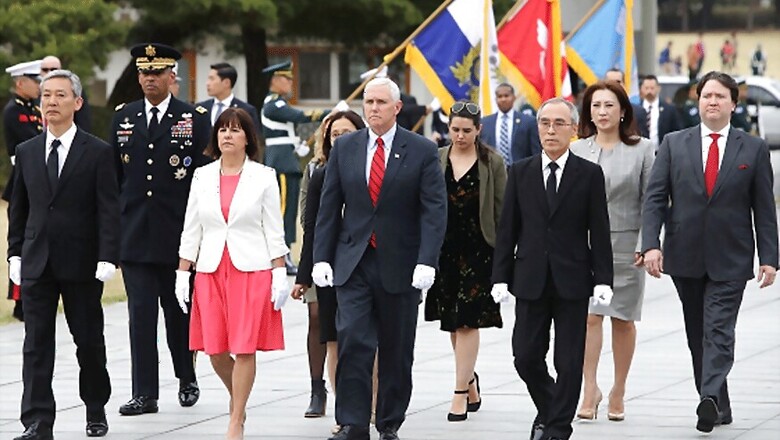
views
Demilitarised Zone, South Korea: U.S. Vice President Mike Pence looked across the demilitarised border between North and South Korea on Monday, a day after North Korea's failed missile launch, reiterating that the US was keeping all options on the table in response to Pyongyang.
"All options are on the table to achieve the objectives and ensure the stability of the people of this country," he said, adding that U.S. President Donald Trump has made clear he won't talk about specific military tactics.
"There was a period of strategic patience but the era of strategic patience is over," Pence told reporters.
Pence is on the first stop of a four-nation Asia tour intended to show America's allies - and remind its adversaries - that the Trump administration is not turning its back on the increasingly volatile region.
The United States, its allies and China are working together on a range of responses to North Korea's latest failed ballistic missile test, Trump's national security adviser said on Sunday, citing what he called an international consensus to act.
H.R. McMaster indicated that Trump was not considering military action for now, even as a nuclear-powered aircraft carrier strike group was heading for the region.
"It's time for us to undertake all actions we can, short of a military option, to try to resolve this peacefully," he said on ABC's "This Week" programme. "We are working together with our allies and partners and with the Chinese leadership to develop a range of options.
"There is an international consensus now, including the Chinese leadership, that this is a situation that just cannot continue."
The Trump administration is focusing its North Korea strategy on tougher economic sanctions, possibly including an oil embargo, a global ban on its airline, intercepting cargo ships and punishing Chinese banks doing business with Pyongyang, Reuters reported last week, citing U.S. officials.
While Trump has employed tough rhetoric in response to North Korea's recent missile tests, the new U.S. president's options appear limited in dealing with a challenge that has vexed his Oval Office predecessors.
Most options fall into four categories: economic sanctions, covert action, diplomatic negotiations and military force.
Pence landed in South Korea hours after the North's failed missile launch. His visit came a day after North Korea held a military parade in its capital, Pyongyang, marking the 105th anniversary of the birth of founding father Kim Il Sung.
What appeared to be new long-range ballistic missiles were on display in the parade."WE'LL SEE WHAT HAPPENS"
Tensions have risen as Trump takes a hard rhetorical line with North Korean leader Kim Jong Un, who has rebuffed admonitions from China and proceeded with nuclear and missile programmes seen by Washington as a direct threat.
Trump acknowledged on Sunday that the softer line he had taken on China's management of its currency was linked to Beijing's help on the North Korea issue.
"Why would I call China a currency manipulator when they are working with us on the North Korean problem? We will see what happens!" Trump said on Twitter. Trump has backed away from a campaign promise to label China in that way.
Pence said Trump was hopeful China "will take actions needed to bring about change in policy" in North Korea.
"But as the president has made very clear, either China will deal with this problem or the United States and our allies will," he said.
"Japan will closely cooperate with the U.S. and South Korea over North Korea and will call for China to take a bigger role," Abe told parliament.
However, a U.S. foreign policy adviser travelling with Pence sought to defuse some of the tension, saying Sunday's test of what was believed to be a medium-range missile had come as no surprise.
"We had good intelligence before the launch and good intelligence after the launch," the adviser told reporters on condition of anonymity.
China has spoken out against the North's weapons tests and has supported U.N. sanctions. It has repeatedly called for talks while appearing increasingly frustrated with the North.
Beijing banned imports of North Korean coal on Feb. 26, cutting off Pyongyang's most important export. China's customs department issued an order on April 7 telling traders to return North Korean coal cargoes, trading sources said.
Pyongyang has conducted several missile and nuclear tests in defiance of U.N. sanctions, and regularly threatens to destroy South Korea and the United States. North and South Korea are technically still at war because their 1950-1953 conflict ended in a truce, not a treaty.
The North has said it has developed and would launch a missile that can strike the U.S. mainland, but officials and experts believe it is some time away from mastering the necessary technology, including miniaturising a nuclear warhead.
Sunday's missile launch was a calculated move, the China Daily newspaper said in an editorial.
"And making it without prompting a furious response from Washington surely qualifies as a win to some degree from Kim's perspective," it said, referring to leader Kim Jong Un.















Comments
0 comment